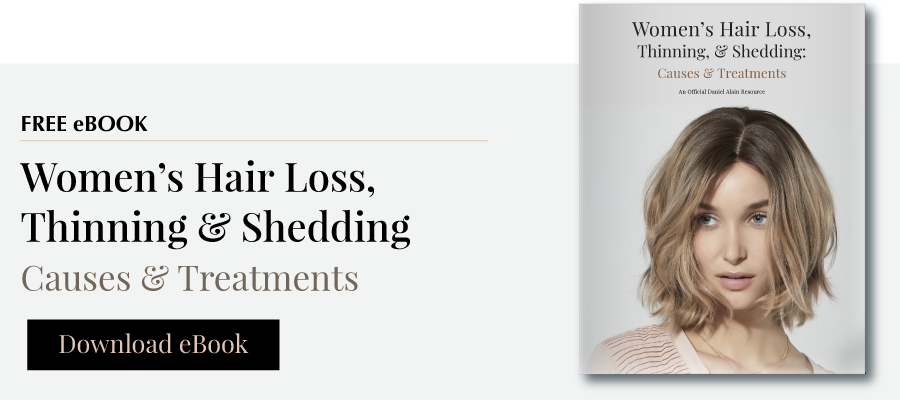Why Is My Hair Falling Out?
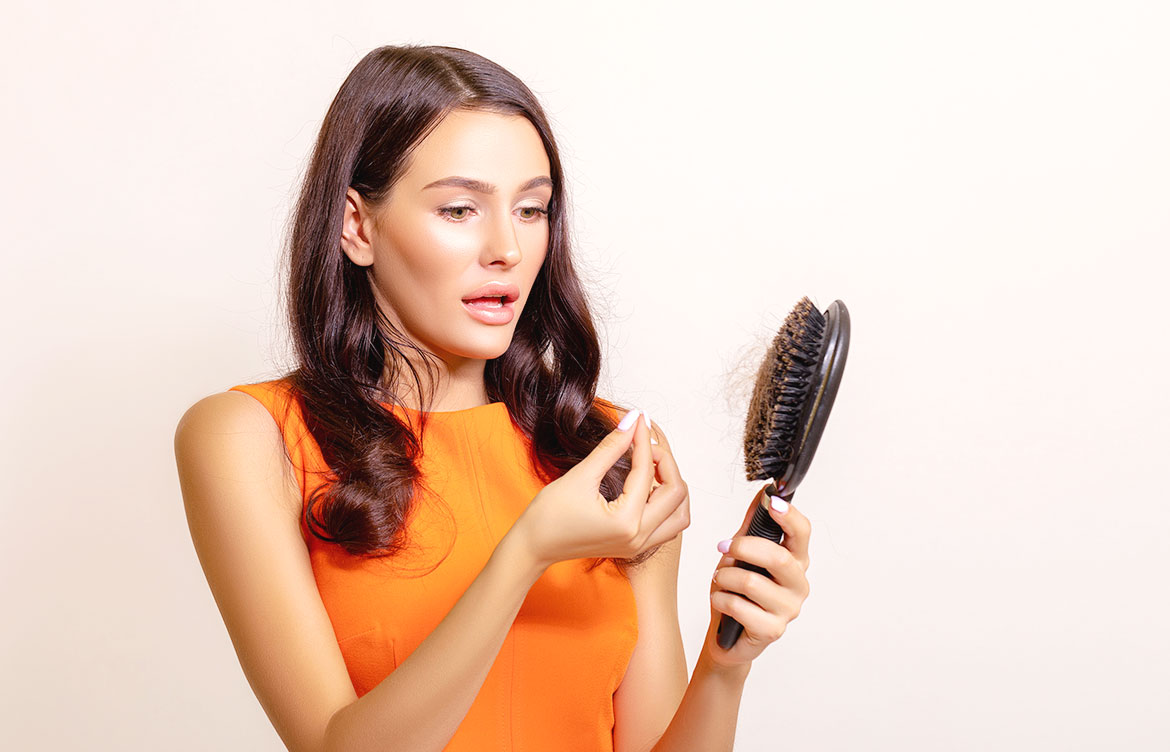
Hair falls out for many reasons, but any woman battling hair loss will tell you that pinpointing the exact cause is nothing short of maddening. We hear you. We’ve seen so many cases of women’s hair loss, and while each experience is unique, the feeling of losing control is very common. You wonder: why is my hair falling out?
Fact is, there are dozens of female hair fall reasons, from genetics to hormones to age, to postpartum to medical illness.
Is there a light at the end of this hair loss tunnel? Absolutely. You can and will overcome hair loss. It’ll get easier when you learn the reason for your hair loss and find an aligned solution. And when that happens? Your shoulders float back, you hold your head high with confidence, and you’ll flip your hair.
To get you there, let’s tackle the precise reason behind hair fall, and what you can do about it.
You might look at women around you and feel isolated in your hair loss. All of my friends have decent hair, so why is my hair falling out?
Hair fall isn’t limited to your grandparents or the occasional celebrity. Just because you don’t hear about it, doesn’t mean it’s not happening. Sadly, many women feel ashamed of their hair loss, locking in their struggle to bear the burden alone.
Let’s change the narrative by openly discussing the reasons hair falls out.
The Most Common Reasons for Hair Fall in Females
As we explain each hair fall reason, notice if any of the signs and symptoms relate to your experience with hair loss. By keeping track, you’ll better pinpoint the cause, and thus, find appropriate solutions.
Age
Over 55% of women will lose some hair by the time they’re 70. We know what you’re thinking: I’m not 70 yet, so why is my hair falling out?
This statistic doesn’t mean it’s abnormal to lose your hair earlier. We’ll cover a few more hair loss reasons throughout the article, but many of them relate to age. Menopause can affect hair fall, and that happens in your 40s-50s.
One dermatology study notes that peak scalp coverage occurs around age 35 for women. After that? It’s normal to see a steady decrease in hair thickness and density.
Bottom line? Aging can affect your hair as young as 35. But what if it happens earlier than this? As we mentioned, age is only one reason behind hair fall.
Genetics
Think about the women in your family. Did your mom ever struggle with hair loss? Was your aunt’s hair uncharacteristically thin?
If that’s the case, you might be one step closer to determining your hair fall reason. For example, medical experts assert that women may inherit hair loss genes from either their mothers, fathers, or both parents.
Androgenetic alopecia, or genetic hair loss, affects almost 50% of women at some point in their life. Experts found that genetic hair loss can begin as early as the onset of puberty; however, it’s more likely that it’ll manifest in your 40s.
Women with hereditary hair loss have an abnormal response to androgens – male sex hormones like testosterone. Their androgen receptors work into overdrive, leading to follicular miniaturization. This shortens the anagen (growth) phase of the hair growth cycle.
The result? Thinner, shorter hair follicles and the onset of hair loss or thinning.
Is there a solution? Solutions like Minoxidil or a human hair wig are great options.
What else causes hair to fall out?
Hormonal Imbalances
Throughout a woman’s life, hormones constantly shift. These important messengers work every day to send signals that coordinate different bodily functions. A big role to play in your health — and your hair.
Estrogen and progesterone are reproductive and sexual health hormones. A surplus of either hormone can worsen your period cramps, and make you feel sluggish, depressed, and fatigued.
Too little estrogen and progesterone aren’t good either. Progesterone slows down testosterone to DHT conversion, which causes hair loss. Lower levels consequently link to higher DHT levels, which cause hair loss.
If your body doesn’t produce enough estrogen, you will notice more hair growth. However, it’ll be on your face and chin (facial hirsutism). As for your scalp hair? Low estrogen levels slow down hair growth and cause telogen effluvium or postpartum hair loss.
Hormone imbalances might feel out of your control, but you can correct them with lifestyle changes.
Hairstyles
Who wears tight braids and buns better than Alicia Keys? From cornrows and slicked baby hairs to a strikingly thick meta braid, Keys awakens a feminine fierceness with every tight hairstyle.
But tight hairstyles shouldn’t be worn every day because they can cause traction alopecia, a type of hair loss caused by pulling on the hair follicles.
Our advice? Opt for looser styles for your everyday look, and reserve tight hairstyles for occasional styling.
Seasonal
If you know anyone with a pet husky, you know not to visit their house in the summer. Why? Because you’ll be covered in fur. Summer is shedding season for huskies.
And seasonal hair shedding is a thing for women, too! August and September are peak hair shedding times for women. We can see that from the surplus of female hair loss Google searches around that time of year! The good news? It’s seasonal, and shouldn’t last beyond a few months.
Washing
Do you notice hair loss only in the shower? Maybe it’s due to an underlying health condition or hormone imbalance.
Or maybe washing is just a high-shedding activity. That’s enough of a hair loss cause for many women. Keep in mind that even with showering, women lose an average of 50-150 hairs per day.
But if you start to notice large hair clumps on your shower wall, consider consulting a doctor.
Let’s take a look at two more high-shedding activities.
Brushing
How often do you grab messy chunks of hair from your hairbrush? We’ve all been there! Some hair loss during brushing is normal, as it’s a high-shedding activity.
But some tendencies might result in more hair loss than usual. For example, aggressive or over-brushing stresses out your hair fibers and causes breakage.
You don’t want to tackle a head full of tangled hair in one sweeping brush — it just won’t happen without yanking out a bunch of hair. Instead, start combing out tangles from the ends, then move to the top. You might also consider upgrading your hairbrush.
Styling
Brushing, washing, and styling make up the three highest shedding activities your hair encounters. The solution? Avoid over-styling and using too much heat. Curling irons and blow dryers keep your hair coiffed but at the expense of your hair follicles. Try to minimize heat-styling and always use a protective spray.
Not Enough Iron
When you breathe in, your body uses oxygen to power all your organs. Except that oxygen goes nowhere without the help of iron, a hemoglobin component that delivers oxygen throughout your body.
Low iron is linked to countless ailments, such as fatigue, trouble concentrating, congestive heart failure, and hair loss.
Your hair follicles and scalp need oxygen to operate efficiently and grow more hair. If you’re experiencing hair loss, talk to your doctor about getting a blood panel test. They can measure your nutrient levels to ensure you have enough iron and vital nutrients necessary to healthy hair growth.
Not Enough Protein
Protein keeps our muscles and hair strong. Pull lightly on a couple of hairs and notice what happens. Does the strand feel stretchy? Does it rip right out? If any of that is true, your hair may be in dire need of some protein.
Stock up on meat, legumes, nuts, and cheese to give your body the protein it needs to grow luscious, strong hair.
Diet
We mentioned the importance of iron and protein for healthy hair. What other nutrients are vital to healthy hair growth?
Your hair follicles are hungry for nutrients like omega fatty acids, Vitamin B12, D and K, calcium, and biotin. A shortage could result in hair fall, but it’s nothing you can’t rectify.
This often accompanies dieting. Do you try out fad diets every so often? You could be depriving your hair of essential nutrients and promoting nutritional deficiencies. In fact, the shock of an invasive diet like this could cause telogen effluvium, a stress-related hair loss condition.
Stress and Anxiety
We’re sure you’ve heard this advice from your doctor, boss, and parents: don’t stress yourself out too much. But in this day and age, it’s impossible to avoid stress altogether. But unfortunately, stress is a killer, with a reputation for demolishing mental health, peace of mind, productivity, confidence, and even hair.
If you’ve caught yourself ruminating on stressful triggers, your stress could be compounding into anxiety. Stress causes anxiety, and can literally make us worry about things until our hair falls out.
Any time you’re stressed, your body releases a hormone called cortisol. This stress hormone triggers your body’s fight or flight response, putting it on edge and interrupting your hair follicles’ growth cycle.
Some things that cause stress include:
- Work issues
- Familial and relationship tension
- Crash diets
- Lack of sleep
- Trauma
Hair loss from stress will grow back — but only when you address the core of what’s stressing you out. Carve out some zen with a therapist, yoga sessions, a long walk, or any peaceful activities that alleviate your stress.
Illnesses
Every illness has symptoms. Diabetes causes fatigue; psoriasis causes itchy skin; lupus causes light sensitivity; and so on. But did you know hair loss is a symptom of all the above illnesses?
Here are some more medical conditions with hair fall as a symptom:
- Crohn’s disease
- Thyroid disorders
- Syphilis
- Graves’ disease
- Anemia
Fortunately, you can manage symptoms with medication. Just make sure you check the side effects first. If you’re unsure what’s causing your hair loss and suspect a medical issue may be at play, consult with your doctor asap.
Medications
The answer to what’s causing your hair loss could be in your medication cabinet. Prescribed drugs such as antidepressants, steroids, mood stabilizers, blood thinners, gout, heart, and blood pressure meds can all cause hair loss in some patients.
Double-check the side effects listed on your meds. If you find that your medication could be causing your hair loss, consult your doctor about your options to see if there is an alternative.
Birth Control
Birth control notoriously has a long list of side effects. Remember how hormonal imbalances cause hair loss in some women? Birth control takes your hormones (and sometimes your hair follicles) on a ride. One medical study describes contraceptives with a high androgen index as posing more risk for hair fall in women.
Radiation
Radiation is one of the biggest reasons why your hair falls out during cancer treatment. While the treatment aims to destroy cancerous cells, some of your healthy cells are affected as well — including hair cells within the follicles. Despite countless studies about cancer therapy and hair loss, more research is needed to learn about preventative strategies.
Menopause
Remember how we found out that 50% of women will experience hair loss at some point? That number is highly populated by women in their 50s, which is when many women experience menopause.
Along with hot flashes and weight gain, hair loss makes an appearance during menopausal years. This is because the hormones are shifting drastically. However, as your body adapts to being in menopause, hair loss should subside.
Postpartum
The real cause behind postpartum hair fall is hormones. When you’re pregnant, a surplus of estrogen makes your hair look more shiny, voluminous, and thicker than ever before.
After you give birth, that estrogen all but disappears. Now your body’s dealing with the worst possible hormone imbalance for hair loss — low estrogen and high cortisol (stress).
However, postpartum hair fall is common, and you can overcome it naturally within a few months.
We’ve explored the long list of hair fall reasons. What solutions are available to help you treat, combat, or conceal hair loss?
How Do I Stop My Hair From Falling Out?
You came here to answer the question: why is my hair falling out? Hopefully, reading through this list of hair loss reasons helps to shed light on what’s causing your hair loss. From there, you’ll set on the path to aligned solutions. Below, we’ve shared some of the best solutions available for you.
Use an Anti-Hair Fall Treatment to Retain Your Hair
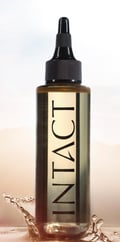 If you suspect androgenetic alopecia (genetic hair loss) is the culprit behind your hair loss, the goal should be to retain your existing hair.
If you suspect androgenetic alopecia (genetic hair loss) is the culprit behind your hair loss, the goal should be to retain your existing hair.
Enter INTACT, Daniel Alain’s hair fall treatment designed to minimize hair fall by gripping onto each hair strand at the root. The treatment contains lab-created, patented PiliLock® Sevilla Orange Complex, a revolutionary root-securing technology that locks your hairs in place — even during high shedding activities like showering and styling.
Hair Transplant Surgery
Hair transplant surgery is an expensive procedure where a doctor removes hair follicles from a dense area on your scalp. Those follicles are grafted and placed on patches of balding or thinning hair.
The surgery is a bit invasive, and your scalp may feel irritated for a few months after surgery.
Is there a less-invasive hair loss solution?
Platelet-Rich Plasma (PRP) Injections
Platelet-rich plasma injections are a supercharge of nutrients into every one of your hair strands. First, a doctor withdraws some of your blood and separates protein-filled platelets from its plasma. After that? Those nutrient-rich platelets are injected into your hair loss areas. The process is relatively seamless, and you’ll notice results within six months.
What Else Can I Do for Hair Fall?
The best hair loss treatment plan is a proactive plan. You’ll want to hit it from many angles to achieve the greatest chance of preserving your hair or regrowing lost hair.
Take a Test to See if Minoxidil Will Regrow Your Hair
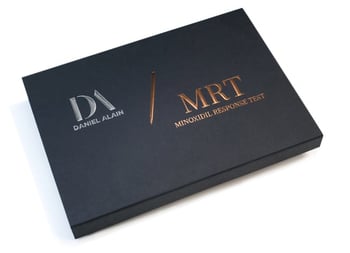 Minoxidil is a drug that improves hair growth and density. Maybe you’ve noticed it at your local drugstore under its popular brand-version Rogaine®. Now, you’ll see claims like “#1 dermatologist-recommended brand for thinning hair” on its packaging.
Minoxidil is a drug that improves hair growth and density. Maybe you’ve noticed it at your local drugstore under its popular brand-version Rogaine®. Now, you’ll see claims like “#1 dermatologist-recommended brand for thinning hair” on its packaging.
But, unfortunately, Minoxidil doesn’t work for everyone. For years, women had to try Minoxidil for months and hope to see results, often left at square one.
Daniel Alain’s research uncovered a breakthrough in Minoxidil’s efficacy: it only works for people that have SULT1A1 enzyme activity. Without this vital activity in your scalp, you won’t see results from Minoxidil.
To save you time, money, and hopes invested into a product that may not work for you, Daniel Alain developed the first-ever Minoxidil Response Test (MRT), the only way to know for sure if you’ll respond to Minoxidil.
All you have to do is send us a few hair samples plucked at home. We’ll test them in our CLIA-certified lab for the necessary enzyme activity. You’ll know within one week whether the drug will work.
Consider Wearing a Wig
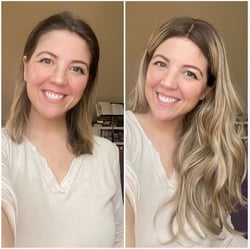 Wearing a wig is like a sigh of relief. No more supplements, no more medications… No more waiting.
Wearing a wig is like a sigh of relief. No more supplements, no more medications… No more waiting.
A premium human hair wig offers you comfort and security wherever you go, knowing your hair loss is absolutely undetectable. Daniel Alain’s 100% human hair wigs offer optimal scalp coverage to conceal thinning and loss. Every piece is meticulously hand-crafted to give you supple, gorgeous hair that makes you feel beautiful.
Ready to Find a Solution for Hair Fall at Daniel Alain?
We know how agonizing it feels to lose your hair. The emotional roller coaster makes it painstaking to bear alone, let alone share it with others. But we understand what you’re experiencing. For decades, we’ve helped women like you reclaim their confidence with trusted hair loss solutions.
Whether it’s a finely crafted, 100% European human hair wig or a reliable hair fall treatment, Daniel Alain is here to help you gracefully reawaken the confident, beautiful woman you are.
Ready to find the right solution for your hair loss? We’re eager to help you! Browse our Follea wig collection today, schedule a consultation with one of our stylists, or browse our Learning Center to find answers to all of your hair loss questions.
NEED HELP FINDING A HAIR LOSS SOLUTION?
Schedule a Free Consultation with One of Our Stylists

Frequently Asked Questions
How Can I Strengthen My Hair?
You can strengthen your hair by stocking up on high-protein and high-iron foods like leafy greens, beans, cheeses, and whole grains, or by using an anti-shedding treatment that locks in hair at the root.
Can Hair Fall Be Prevented?
You can prevent some hair fall causes, but not all of them. For example, you can prevent stress-related and diet-related hair loss conditions with lifestyle habits. However, you can’t prevent genetic hair loss.
Why Am I Losing More Hair than Normal?
There’s no shortage of hair fall reasons. You might be losing more hair than normal due to hormone imbalances, genetics, birth control, and many other reasons.
Is it Normal for Hair to Fall Out?
It’s normal to lose between 50 and 150 hairs per day. Anything beyond this is considered excessive hair fall.
Does Hair Regrow After Hair Fall?
Sometimes, yes. You can regrow hair after hair fall with medication like Minoxidil and Finasteride or with hair loss solutions like PRP and hair transplant surgery.
How Can I Identify the Reason for Hair Fall?
Take an inventory of your habits in these areas:
- Nutrition
- Exercise
- Hairstyles and brushing
Then, compare them with common hair loss causes to find any overlap. Of course, the best way to identify hair fall reasons is by consulting your doctor. They might conduct a biopsy or blood test to determine the cause of hair loss.
Which Foods Can Reduce Hair Fall?
Foods rich in iron and protein, like lean meats and legumes, or omegas and vitamin B12, like eggs and fish, can reduce hair fall. Also, stock up on leafy greens and fruits rich in antioxidants.
Is Water a Reason for Hair Fall?
Washing your hair is a high-shedding activity. It’s normal for more hair to fall during showers, but if your hair sheds excessively outside of showering, it could indicate an underlying issue.
Which Lack of Vitamin Causes Hair Fall?
Any lack of the following vitamins may cause hair fall:
- Vitamin A
- Vitamin B12
- Vitamin D
- Vitamin K
- Biotin
- Calcium
- Iron
What is Hair Fall Season?
Hair fall season for most women is in late summer and early autumn.
Can Biotin Stop Hair Fall?
Many supplement brands boast biotin as a hair-growing vitamin, but research proving supplements as a viable solution is limited.
Why Does My Hair Fall Out When Touching?
If your hair falls out when you run your fingers through it, you could have a hair loss condition. Consult a doctor if you notice excessive hair fall after touching your hair.
Is Dandruff a Reason for Hair Fall?
Dandruff doesn’t directly cause hair fall. However, the two are indirectly linked by excessive scratching, irritation, and dry scalp.
What are the Reasons for Hair Fall in Teenage Girls?
Teenage girls might experience hair fall for a wide host of reasons, including:
- Genetics
- Hormone changes
- Stress
- Nutrition deficiencies
Can COVID Make Your Hair Fall Out?
There is a link between COVID-19 and hair loss. The American Association of Dermatology describes hair fall as a common symptom 2-3 weeks after a fever. Since patients with COVID-19 have fevers and getting the virus causes excessive stress, hair fall is a common symptom.
Does Losing Weight Cause Hair Fall?
Yes, if rapid weight loss causes you to lose too many nutrients required for the follicles to produce new hairs. Losing weight too quickly often shocks your body, causing a stress-related hair loss condition called telogen effluvium.
Can Lack of Sleep Cause Hair Fall?
Certainly. Sleep is necessary to perform optimally in every way, from basic bodily functions to work tasks. A lack of sleep causes stress to your body, which can cause telogen effluvium, a hair loss condition.
What are the Signs of Excessive Hair Fall?
Hair clumps in the shower and brush, and more than 150 hairs per day are both signs of excessive hair fall. You might also look for a widening hair part or receding hairline.
When Should I See a Doctor About Hair Fall?
See a doctor as soon as you notice excessive hair fall so that you can quickly know the reason for your hair loss and get an appropriate prognosis.
What is the Best Treatment for Hair Fall?
The best treatment for hair fall is one that’s tailored to your unique hair fall reason, such as an anti-hair shedding treatment that locks in hair strands at the roots to prevent hair loss during high-shedding activities like brushing and washing.


